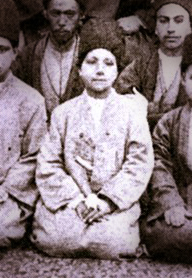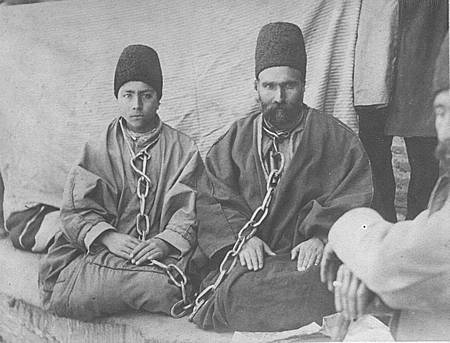Rúhu'lláh
This article does not cite any sources; the information may not be accurate or reliable. |
Rúhu'lláh | |
|---|---|
 Rúhu'lláh from a photo with the Bahá'i pioneers of Iran, about 1891 in Tabriz. | |
| Born | Rúhu'lláh |
| Died | 1896 Tehran, Iran |
| Nationality | Persian |
| Parent(s) | Father: Varqá |
Rúhu'lláh literally means the 'Spirit of God', a title of Christ mentioned in the Qur'án.
Truly, Rúhu’lláh was no ordinary child. He was an inspired being and acted as a spiritual giant. At a young age he wrote beautiful poetry which clearly demonstrates how deep was his love for Bahá’u'lláh and ‘Abdu’l-Bahá, how vast his knowledge of the Faith and how profound his understanding of the real purpose of life. He used to speak about the Faith in gatherings of divines and men of learning with such eloquence and knowledge, and produce such irrefutable proofs of the truth of the Faith that many were confounded after hearing him. His answers were profound yet simple and very compelling.

There are some delightful stories related to this indefatigable child-teacher of the Cause of God. To cite an example: Although only twelve years of age, Rúhu’lláh attended with his father several meetings in Zanján at which the divines of the city were present. The Governor of Zanján, ‘Alá’u'd-Dawlih, had especially arranged these meetings in order that Varqá might confront the divines in defence of his Faith. Hájí Mírzá Haydar-’Alí has written about this in his celebrated book of reminiscences, the Bihjatu’s-Sudúr.
References[edit]
- Taherzadeh, Adib (1973). Revelation of Bahá’u’lláh Vol. 4. George Ronald Publisher Ltd. ISBN HC 978-0-85398-269-4.
Table Of Contents
-
1.1 References